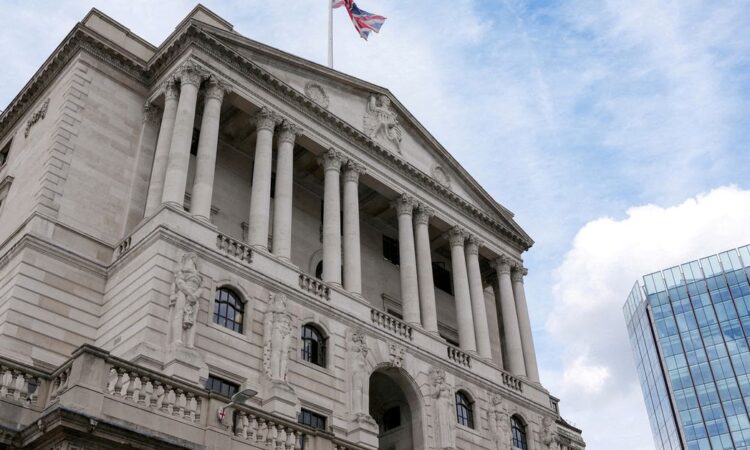
[1/2]A general view of the Bank of England (BoE) building, in London, Britain, August 4, 2022. REUTERS/Maja Smiejkowska/File Photo Acquire Licensing Rights
LONDON, Oct 19 (Reuters) – A future British government should consider raising the Bank of England’s inflation target from 2% to 3% to give it more room for manoeuvre during economic downturns and ease the burden on the public finances, a leading think tank said on Thursday.
The Resolution Foundation said a raised inflation target would allow higher nominal interest rates, leaving more room for them to be cut in a downturn.
Combined with a willingness to cut rates as low as minus 1%, this would allow the BoE to provide more interest-rate stimulus during a crisis, reducing the need for government borrowing and for bond-buying by the central bank, the think tank said.
“The Bank of England needs greater monetary firepower, secured by enabling slightly negative interest rates and taking steps to move to a 3% inflation target,” James Smith, research director at the foundation and a former BoE economist, said.
Changing the inflation target should only happen once the BoE has returned price growth to its current 2% target, to avoid damaging the central bank’s credibility, the think tank said.
British inflation hit a 41-year high of 11.1% a year ago and at 6.7% remains the highest among major advanced economies.
A review of the BoE’s inflation-targeting framework is likely after Britain’s next national election expected in 2024.
The report said any change to the inflation target would ideally be done in coordination with other advanced economies, to limit the negative impact on sterling from setting a higher inflation target than the United States and the euro zone.
But if that was impossible, a weaker currency would be a price worth paying, it said.
Without more monetary policy flexibility, government debt levels were likely to keep rising – potentially almost doubling to 190% of national income over the next 50 years.
Both the government’s Office for Budget Responsibility and the independent Institute for Fiscal Studies have given similar warnings recently about rising debt.
While British governments typically balance day-to-day spending and tax revenues, they do not run the surpluses needed to repay the borrowing caused by shocks such as the financial crisis, COVID-19 pandemic or last year’s surge in energy prices.
British government debt now stands at nearly 100% of annual gross domestic product, up from under 40% before the 2008 financial crisis.
Reporting by David Milliken
Editing by William Schomberg
Our Standards: The Thomson Reuters Trust Principles.





